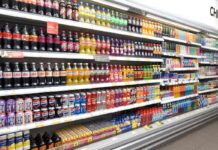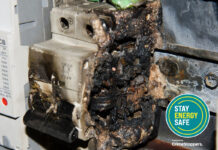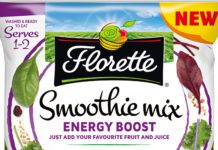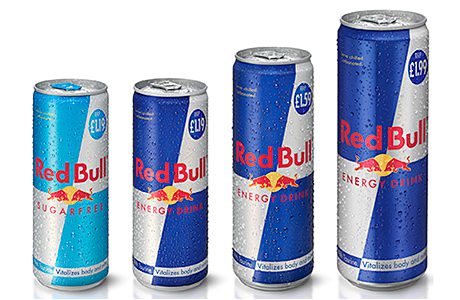
THE Mintel research covered in our report on pages 66 and 68 shows that while some consumers have been buying into functional and energy drinks and have helped sales grow considerably others are more reticent and need to be persuaded to enter the market.
It’s a theme that some of the major brands and suppliers have also identified in recent times.
Earlier this year functional drinks brand leader Red Bull told Scottish Grocer that it viewed energy-drink consumers as looking for healthier products, an exciting range of tastes (especially those who simply didn’t like traditional energy drink flavours) and value for money.
“Red Bull always stays focused on the core plan and what the consumer wants,” Gavin Lissimore, Red Bull head of category marketing, said ahead of the busy summer soft drinks selling season.
“We listened to those consumers who said they would buy if we were slightly cheaper so we moved our RRP on the price-marked can from £1.35 to £1.19.
“We are planning on driving growth via zero-calories products, driving a strong growth performance within symbols and independents.”
To bring on board the 27% of non-users who described their barrier to buying energy drinks as “taste”, the company launched Red Bull Editions.
Red Bull argues that the growth in the number of sizes of functional drinks packs should lead to some careful merchandising of soft drinks and energy drinks display areas.
The firm suggests that retailers use the “stair step” approach, saying that stocking different sizes of a brand like Red Bull next to each other will encourage consumers to consider going for the larger product, which will increase their overall spend in the store.
One of the other major players in the energy drinks market, Coca-Cola Enterprises, which markets Monster and Relentless, has stressed that purchase of energy drinks for use in the future rather than for immediate drinking, is growing.
Dave Turner, CCE’s trade communications manager said: “The energy drinks sector has sustained its growth with a 6.1% increase in independents and symbols so far in 2014 .
“The growth is largely being led by future-consumption sales, which have seen an impressive increase of 13.1% in independents and symbols, which marks a shift from their heartland of being consumed on the go for an energy boost.
“Sales of instant-consumption formats did continue to increase, growing by 5.2%, demonstrating the continued popularity of the category among those looking to refresh and re-energise while on the go.
Turner was also keen to identify what he sees as lighter options within energy drinks as an area of current and future growth.
“Sales of low-calorie energy drinks rose to £72.6m in the last year, a 19% increase, nearly three times the 6.6% rate of value growth of regular versions,” he said.
In stores the methods of merchandising used on energy drinks can significantly influence sales success, the firm argues. CCE offers a number of merchandising recommendations
• Optimum sales can be achieved by merchandising energy drinks together, towards the centre of the chiller, reflecting their position as one of the most popular sectors of the soft drinks category, the firm says.
• Ease of shopping and a wide range of choice for the consumer are key. Retailers aid the consumer’s experience by stocking different varieties of the same brand adjacent to one another.
• Many consumers buy energy drinks whilst on the move for immediate consumption. Therefore, it’s advised that drinks are stored chilled to help meet demand and drive sales.
• It’s advisable to stock a mix of premium and value brands, helping to offer a choice of price points to suit consumer need.
• ‘Original’ varieties of brands are recommended as a standard offering, together with a selection of different flavours or variations to cater for different tastes.
• With an increasing consumer demand for low-calorie or sugar-free energy drinks, retailers can maximise sales by stocking a selection of those extensions of existing best-selling energy brands.
New products from Coca-Cola Enterprises brands include Monster Assault – launched in June 2014, it’s designed to be refreshing like a traditional soft drink while delivering the Monster Energy blend.
At the beginning of this year Relentless Sugar Free was relaunched as Origin Ultra.
And Relentless Cherry became the latest flavour in the Relentless range in early 2014.
While the recent Mintel report showed sports drinks doing much less well than energy drinks, Georgina Thomas, category director at Lucozade Ribena Suntory, quoting Nielsen data to late June this year, said sports and energy drinks were both showing growth with sports up 2.6% and energy up 7.5% year on year.
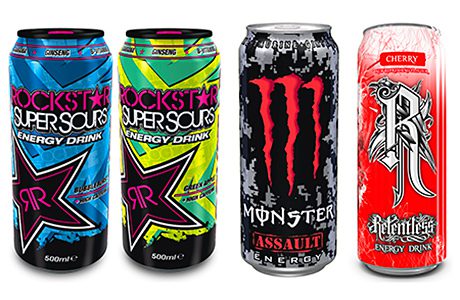
Lucozade Sport, in particular, is currently worth £114.6m and growing at a rate of 12% a year and Lucozade is performing well in Scotland, leading in sports and energy drinks with a 42.3% share of the market, she said.
Value for money, health and innovation are among the things that are encouraging category growth, she suggested.
“Price-marked packs help consumers feel they are getting great value for money, aiding retailers in gaining trust and repeat custom. We have seen more and more retailers experience the benefits of stocking PMPs, with 63% claiming they would be more likely to stock a new product if it is released in a PMP as well as a non-price-marked pack.”
Health considerations are important and that’s true north of the border as well as in the rest of Britain, she said.
“In Scotland, drinks with the added value of contributing to health make up 16% of the total soft drinks market.
“With this in mind, Lucozade Ribena Suntory has launched a new Reduced Sugar Cloudy Lemonade variant to its Lucozade Energy portfolio. With a target audience of 25-34 year old consumers, the new product is an evolution of the existing portfolio to suit changing lifestyles and demand for healthier options.”
Retailers should address key trends to make the most of the energy drinks category, says soft drinks firm AG Barr.
It says energy drinks sales in Scotland are worth £100m and growing at 1% a year but that energy drinks in big cans are growing at 14%.
It reckons the key current trend is the development of flavoured energy drinks.
“Consumers are constantly seeking exciting new flavours when it comes to energy,” said Adrian Troy, AG Barr head of marketing.
In 500ml canned energy drinks flavoured varieties are said to increasing sales by 57%. AG Barr says the Rockstar brand, which it handles, is leading the growth. It now offers a range of 11 flavours.
At Vimto UK, which markets Extreme Energy Drink and Extreme Sports Drink, marketing manager Emma Hunt said: “The category has continued to develop at a fast pace and sports and energy drinks are increasingly becoming part of consumers’ everyday consumption. There has been a growth in the number of drinking occasions emerging for energy and sports and this can be attributed to the continual innovation to build on the category fuelled by consumers’ continual thirst to try new products.
“Overall, the trend in healthier lifestyles has buoyed the category, with more consumers buying into sports and energy brands that support this.
“One important trend impacting the market has been a significant rise in 18-34 year-olds participating in extreme sports, more than any other group of outdoor sports and, as a result, there has been a rise in demand for sports drinks like Extreme from this audience.
“Aside from location, value for money is now a main reason why shoppers choose where to do their grocery shopping and, inevitably, value has become a factor in consumer purchasing decisions within the sports and energy category.
“Brands have responded to this through the availability of price-marked packs, which we can attribute to the year-on-year increase in volume of sales in sports drinks in the convenience channel.”
No Fear Energy Drinks this year launched a promotional campaign that gave those who purchase promotional cans of limited-edition No Fear Extreme Energy a free music download.
The brand has promoted the campaign with Capital Radio advertising and Sky Television advertising.
To claim their free music track, consumers collect a code under the ring pull of each promotional can and visit www.nofearfreemusic.com
The brand owner says No Fear is the fastest-growing functional energy brand showing year-on-year growth of 84% as measured by IRI, and shows no sign of slowing down.




